Sizhe Yuen
Intrinsic Memory Agents: Heterogeneous Multi-Agent LLM Systems through Structured Contextual Memory
Aug 12, 2025Abstract:Multi-agent systems built on Large Language Models (LLMs) show exceptional promise for complex collaborative problem-solving, yet they face fundamental challenges stemming from context window limitations that impair memory consistency, role adherence, and procedural integrity. This paper introduces Intrinsic Memory Agents, a novel framework that addresses these limitations through structured agent-specific memories that evolve intrinsically with agent outputs. Specifically, our method maintains role-aligned memory templates that preserve specialized perspectives while focusing on task-relevant information. We benchmark our approach on the PDDL dataset, comparing its performance to existing state-of-the-art multi-agentic memory approaches and showing an improvement of 38.6\% with the highest token efficiency. An additional evaluation is performed on a complex data pipeline design task, we demonstrate that our approach produces higher quality designs when comparing 5 metrics: scalability, reliability, usability, cost-effectiveness and documentation with additional qualitative evidence of the improvements. Our findings suggest that addressing memory limitations through structured, intrinsic approaches can improve the capabilities of multi-agent LLM systems on structured planning tasks.
Automatic Dataset Generation for Knowledge Intensive Question Answering Tasks
May 20, 2025Abstract:A question-answering (QA) system is to search suitable answers within a knowledge base. Current QA systems struggle with queries requiring complex reasoning or real-time knowledge integration. They are often supplemented with retrieval techniques on a data source such as Retrieval-Augmented Generation (RAG). However, RAG continues to face challenges in handling complex reasoning and logical connections between multiple sources of information. A novel approach for enhancing Large Language Models (LLMs) in knowledge-intensive QA tasks is presented through the automated generation of context-based QA pairs. This methodology leverages LLMs to create fine-tuning data, reducing reliance on human labelling and improving model comprehension and reasoning capabilities. The proposed system includes an automated QA generator and a model fine-tuner, evaluated using perplexity, ROUGE, BLEU, and BERTScore. Comprehensive experiments demonstrate improvements in logical coherence and factual accuracy, with implications for developing adaptable Artificial Intelligence (AI) systems. Mistral-7b-v0.3 outperforms Llama-3-8b with BERT F1, BLEU, and ROUGE scores 0.858, 0.172, and 0.260 of for the LLM generated QA pairs compared to scores of 0.836, 0.083, and 0.139 for the human annotated QA pairs.
The Effect of Epigenetic Blocking on Dynamic Multi-Objective Optimisation Problems
Nov 25, 2022Abstract:Hundreds of Evolutionary Computation approaches have been reported. From an evolutionary perspective they focus on two fundamental mechanisms: cultural inheritance in Swarm Intelligence and genetic inheritance in Evolutionary Algorithms. Contemporary evolutionary biology looks beyond genetic inheritance, proposing a so-called ``Extended Evolutionary Synthesis''. Many concepts from the Extended Evolutionary Synthesis have been left out of Evolutionary Computation as interest has moved toward specific implementations of the same general mechanisms. One such concept is epigenetic inheritance, which is increasingly considered central to evolutionary thinking. Epigenetic mechanisms allow quick non- or partially-genetic adaptations to environmental changes. Dynamic multi-objective optimisation problems represent similar circumstances to the natural world where fitness can be determined by multiple objectives (traits), and the environment is constantly changing. This paper asks if the advantages that epigenetic inheritance provide in the natural world are replicated in dynamic multi-objective optimisation problems. Specifically, an epigenetic blocking mechanism is applied to a state-of-the-art multi-objective genetic algorithm, MOEA/D-DE, and its performance is compared on three sets of dynamic test functions, FDA, JY, and UDF. The mechanism shows improved performance on 12 of the 16 test problems, providing initial evidence that more algorithms should explore the wealth of epigenetic mechanisms seen in the natural world.
Epigenetic opportunities for Evolutionary Computation
Aug 10, 2021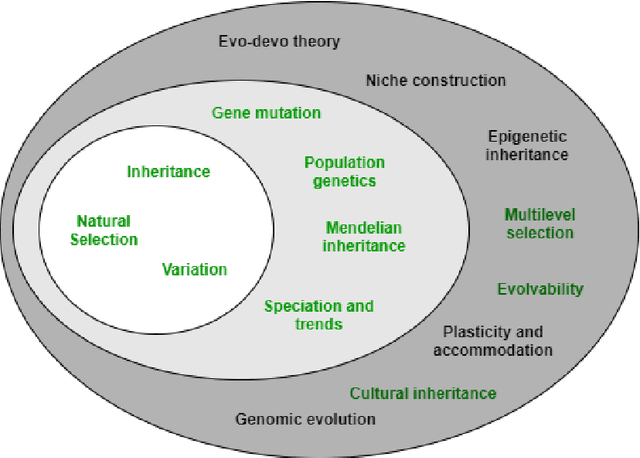
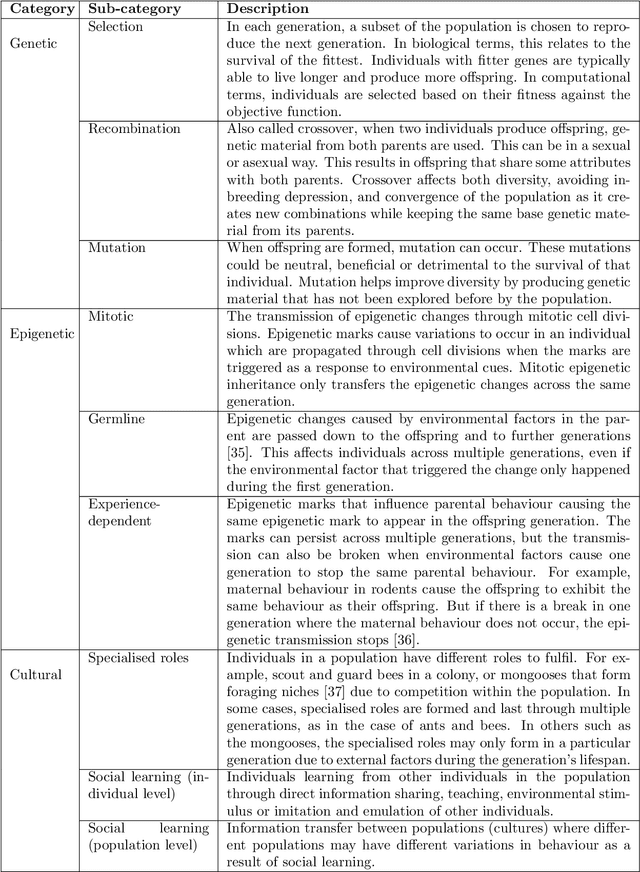
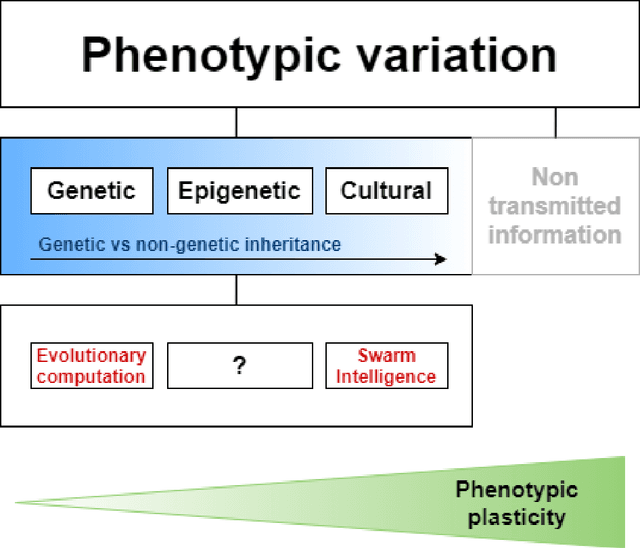
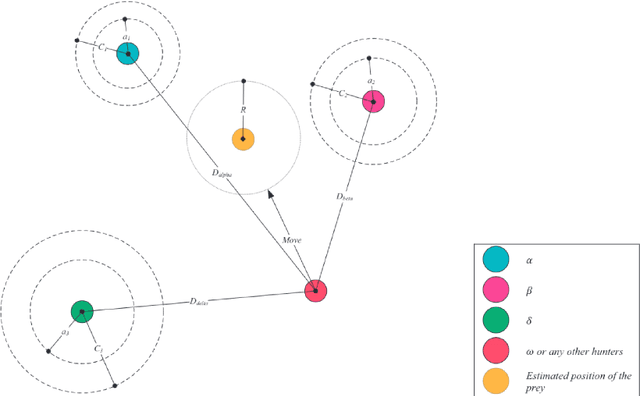
Abstract:Evolutionary Computation is a group of biologically inspired algorithms used to solve complex optimisation problems. It can be split into Evolutionary Algorithms, which take inspiration from genetic inheritance, and Swarm Intelligence algorithms, that take inspiration from cultural inheritance. However, recent developments have focused on computational or mathematical adaptions, leaving their biological roots behind. This has left much of the modern evolutionary literature relatively unexplored. To understand which evolutionary mechanisms have been considered, and which have been overlooked, this paper breaks down successful bio-inspired algorithms under a contemporary biological framework based on the Extended Evolutionary Synthesis, an extension of the classical, genetics focussed, Modern Synthesis. The analysis shows that Darwinism and the Modern Synthesis have been incorporated into Evolutionary Computation but that the Extended Evolutionary Synthesis has been broadly ignored beyond:cultural inheritance, incorporated in the sub-set of Swarm Intelligence algorithms, evolvability, through CMA-ES, and multilevel selection, through Multi-Level Selection Genetic Algorithm. The framework shows a missing gap in epigenetic inheritance for Evolutionary Computation, despite being a key building block in modern interpretations of how evolution occurs. Epigenetic inheritance can explain fast adaptation, without changes in an individual's genotype, by allowing biological organisms to self-adapt quickly to environmental cues, which, increases the speed of convergence while maintaining stability in changing environments. This leaves a diverse range of biologically inspired mechanisms as low hanging fruit that should be explored further within Evolutionary Computation.
Automatic Player Identification in Dota 2
Aug 27, 2020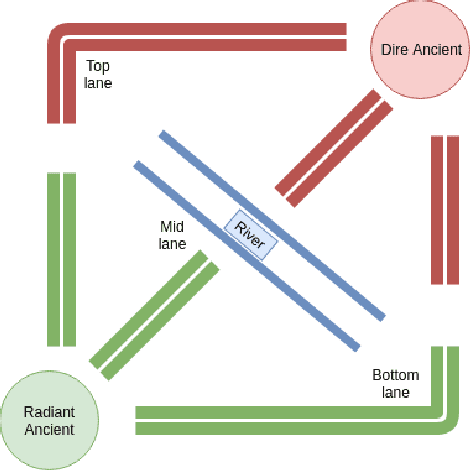
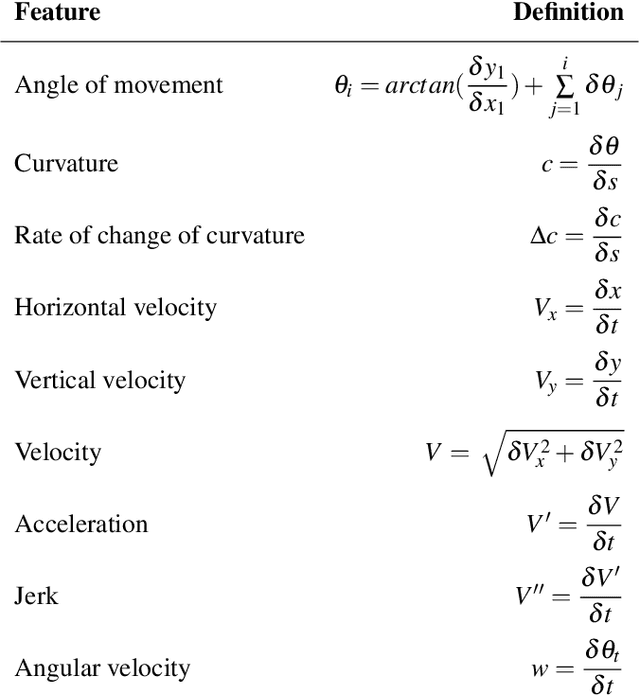
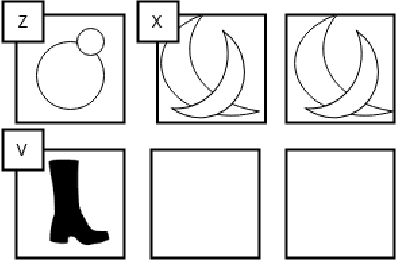
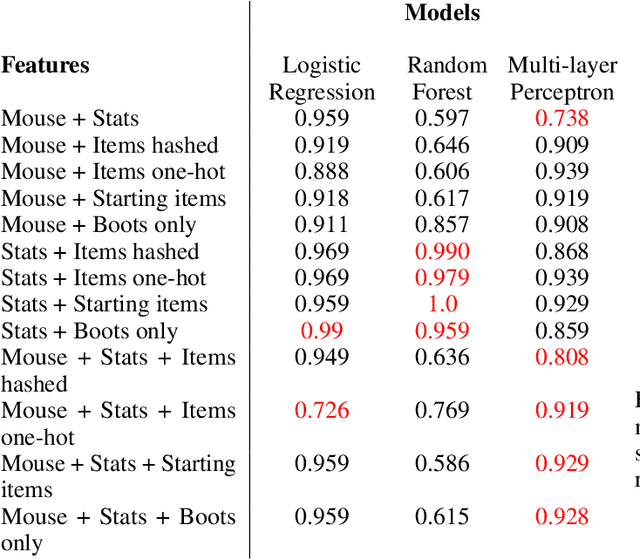
Abstract:Dota 2 is a popular, multiplayer online video game. Like many online games, players are mostly anonymous, being tied only to online accounts which can be readily obtained, sold and shared between multiple people. This makes it difficult to track or ban players who exhibit unwanted behavior online. In this paper, we present a machine learning approach to identify players based a `digital fingerprint' of how they play the game, rather than by account. We use data on mouse movements, in-game statistics and game strategy extracted from match replays and show that for best results, all of these are necessary. We are able to obtain an accuracy of prediction of 95\% for the problem of predicting if two different matches were played by the same player.
 Add to Chrome
Add to Chrome Add to Firefox
Add to Firefox Add to Edge
Add to Edge